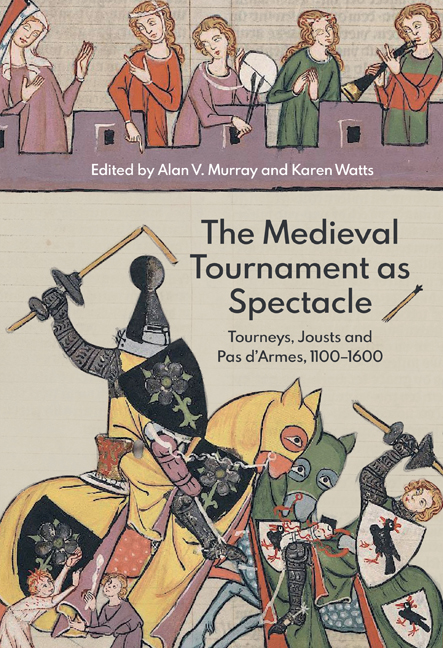Book contents
- Frontmatter
- Contents
- List of Illustrations
- List of Contributors
- Preface and Acknowledgements
- Introduction: From Mass Combat to Field of Cloth of Gold
- Research on the Medieval Tournament (1100–1600): A Select Bibliography
- 1 Now Form Up Close Together! Tactics and Ethos of the Tourney in Early German Sources (Twelfth to Thirteenth Centuries)
- 2 Por pris et por enor: Ideas of Honour as Reflected in the Medieval Tournament
- 3 Richard II of England and the Smithfield Tournament of October 1390: An Instrument to Establish Royal Authority
- 4 Alle myn harneys for the justes: Documents as a Source for Medieval Jousting Armour
- 5 The Tournament Saddle
- 6 Between Sport and Theatre: How Spectacular was the Pas d’armes?
- 7 Art Imitating Life Imitating Art? Representations of the Pas d’armes in Burgundian Prose Romance: The Case of Jehan d’Avennes
- 8 The Foot Combat as Tournament Event: Equipment, Space and Forms
- 9 Power and Pageantry: The Tournament at the Court of Maximilian I
- 10 The Field of Cloth of Gold: Arms, Armour and the Sporting Prowess of King Henry VIII and King Francis I
- Appendix 1 Calendar of the Royal Combats at the Field of Cloth of Gold, June 1520
- Appendix 2 Articles for the Challenge: The Emprise
- Index of Objects
- Index of Manuscripts
- General Index
1 - Now Form Up Close Together! Tactics and Ethos of the Tourney in Early German Sources (Twelfth to Thirteenth Centuries)
Published online by Cambridge University Press: 11 September 2020
- Frontmatter
- Contents
- List of Illustrations
- List of Contributors
- Preface and Acknowledgements
- Introduction: From Mass Combat to Field of Cloth of Gold
- Research on the Medieval Tournament (1100–1600): A Select Bibliography
- 1 Now Form Up Close Together! Tactics and Ethos of the Tourney in Early German Sources (Twelfth to Thirteenth Centuries)
- 2 Por pris et por enor: Ideas of Honour as Reflected in the Medieval Tournament
- 3 Richard II of England and the Smithfield Tournament of October 1390: An Instrument to Establish Royal Authority
- 4 Alle myn harneys for the justes: Documents as a Source for Medieval Jousting Armour
- 5 The Tournament Saddle
- 6 Between Sport and Theatre: How Spectacular was the Pas d’armes?
- 7 Art Imitating Life Imitating Art? Representations of the Pas d’armes in Burgundian Prose Romance: The Case of Jehan d’Avennes
- 8 The Foot Combat as Tournament Event: Equipment, Space and Forms
- 9 Power and Pageantry: The Tournament at the Court of Maximilian I
- 10 The Field of Cloth of Gold: Arms, Armour and the Sporting Prowess of King Henry VIII and King Francis I
- Appendix 1 Calendar of the Royal Combats at the Field of Cloth of Gold, June 1520
- Appendix 2 Articles for the Challenge: The Emprise
- Index of Objects
- Index of Manuscripts
- General Index
Summary
Writing in the third quarter of the sixteenth century, the Swabian historian and humanist Froben Christoph, count of Zimmern and lord of Meßkirch and Wildenstein (1519–66), claimed to know the exact circumstances of the origin of tournaments in Germany. In his family chronicle he wrote that King Henry I of Germany (r. 919–36) wished to commemorate a great victory over the Hungarians so that it would be remembered forever; as tournaments were unknown in any of the German lands at that time, the king decreed that such honourable knightly games, which had hitherto been practised only in France and Great Britain, should be established and promoted in the German Reich, so that the prowess of every knight might be recognised and that the younger members of the nobility might become braver and more skilled in war against their enemies, but that this should not be done ‘for the entertainment of ladies and damsels’. And so, in the year 938, the king, his two sons and some 1,500 princes, counts, free lords and knights took part in this first tournament on German soil.
Froben Christoph's chronology was wanting. Apart from the fact that he dates this tournament to two years after King Henry's death, it becomes clear from his own testimony that he was relying on inaccurate accounts from his own time, notably the tournament book by Georg Rüxner (al. Rixner) who produced a catalogue of thirty-six tournaments held in Germany between their supposed beginning in 938 and the late fifteenth century. Rüxner was a herald in the service of Habsburgs and Wittelsbachs (with the official title of ‘Jerusalem’), a profession associated with tournaments and other events involving coats of arms, but most of the tourneys listed in his book are invented or fanciful. Yet as this example shows, Rüxner's history was highly influential among his contemporaries. As was typical for his day, Froben Christoph believed that nobility had existed since time immemorial and that typical attributes of the noble lifestyle, such as heraldry and tournaments, had been adopted in the distant past.
- Type
- Chapter
- Information
- The Medieval Tournament as SpectacleTourneys, Jousts and Pas d'Armes, 1100-1600, pp. 21 - 43Publisher: Boydell & BrewerPrint publication year: 2020



